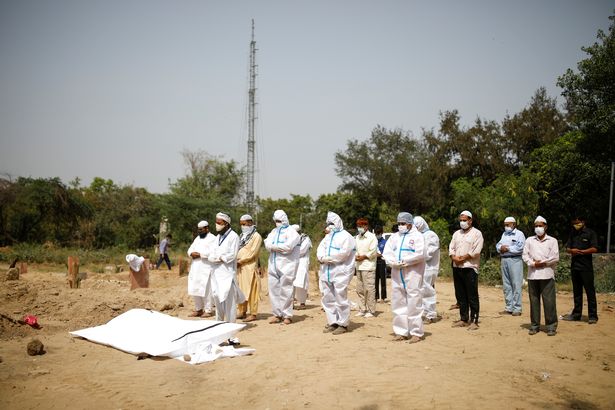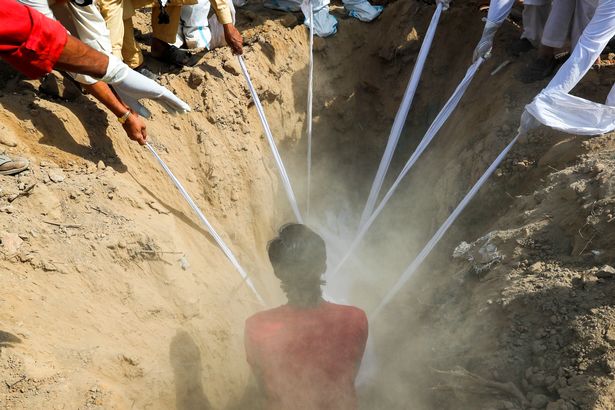India is in the grips of a coronavirus disaster with families reduced to begging overwhelmed hospitals to treat their loved ones.
The country’s healthcare system is buckling as the disease surges rapidly among its 1.36 billion population.
More than 332,000 cases were reported on Friday – setting a world record for a second straight day.
Crematoriums have begun to organise mass funeral pyres to dispose of the exponential number of bodies.
Delhi, the country’s capital, recorded 306 deaths alone in the past 24 hours – roughly one every five minutes.
And some states are now facing an oxygen shortage as coronavirus continues to run rampant amid lax healthcare protocols.
Are you in India? Contact us at webnews@mirror.co.uk

(Image: REUTERS)
The country’s Supreme Court has branded the situation as a national emergency.
Britain’s Prime Minister Boris Johnson has pledged to provide support to India, possibly with ventilators.
Shocking images show hospital patients laying in the dirt outside one hospital, with police deployed to stop the looting of oxygen.
Tragically, 13 people died in a fire in the intensive care unit of a coronavirus medical facility near Mumbai on Friday.
On Wednesday, 24 patients died in another part of the state after a leak interrupted the flow of oxygen to their ventilators.

(Image: AFP via Getty Images)
Thursday saw India’s first world record-breaking day, with 314,835 cases recorded; 332,730 cases were reported on Friday, with 2,263 deaths.
Atul Gogia, a frontline doctor, told Radio 4 this morning that the situation in the country was “both physically mentally emotionally”.
“Everything is full we are over-pressed, staff is catching the disease so we are short of staff as well,” he said.
‘We do have oxygen but it’s now on a day to day basis. We got some oxygen last night, so we have some oxygen now.
‘There is such a huge surge we do not have places in the emergency room.
“We do not have enough oxygen points, patients are coming in with their own oxygen, others without, we want to help them
“But there are not enough beds or oxygen points, and not enough oxygen to supply them even if they are were.”

(Image: REUTERS)
Officials and public figures in India have been criticised for relaxing restrictions too swiftly in the winter, when cases were running low.
But now people losing loved ones are turning to makeshift facilities for burials – because funeral services have been swamped.
And, despite the dire situation in the north, other states are still seeing relatively low cases – meaning the numbers could get higher still.
Prof James Naismith, of the University of Oxford, told MailOnline that, without lockdown, Britain could be in a similar position to India.
“What is happening in India is stark illustration of the havoc that rapid spread of the virus does; healthcare overwhelmed and vulnerable people suffocating to death in ambulances waiting for help,” he said.

(Image: Anadolu Agency via Getty Images)
“This might be an appropriate point for those who so blithely advocated ending the UK lockdown in the autumn and winter to reconsider their analysis.”
Dr Saswati Sinha, a critical care specialist in the eastern city of Kolkata, told the BBC emergency rooms and wards were packed to capacity.
She said: “We are getting direct calls from our patients, our acquaintances, our neighbours: they are pleading with us to be able to accommodate some of their next of kin.
“But unfortunately, our situation is such that, although we are trying our best, we still have a huge number of patients whom we are not able to accommodate.”
“In 20 years of working in intensive care, I have never seen anything of this kind, ever.”
Mr Johnson said Britain was looking at ways to support India.
“We’re looking at what we can do to help and support the people of India, possibly with ventilators,” he said.
“Thanks to the ventilator challenge, the huge efforts of British manufacturers, we’re better able now to deliver ventilators to other countries.
“But also possibly with therapeutics, Dexamethasone, other things, we’ll look at what we can do to help.”


